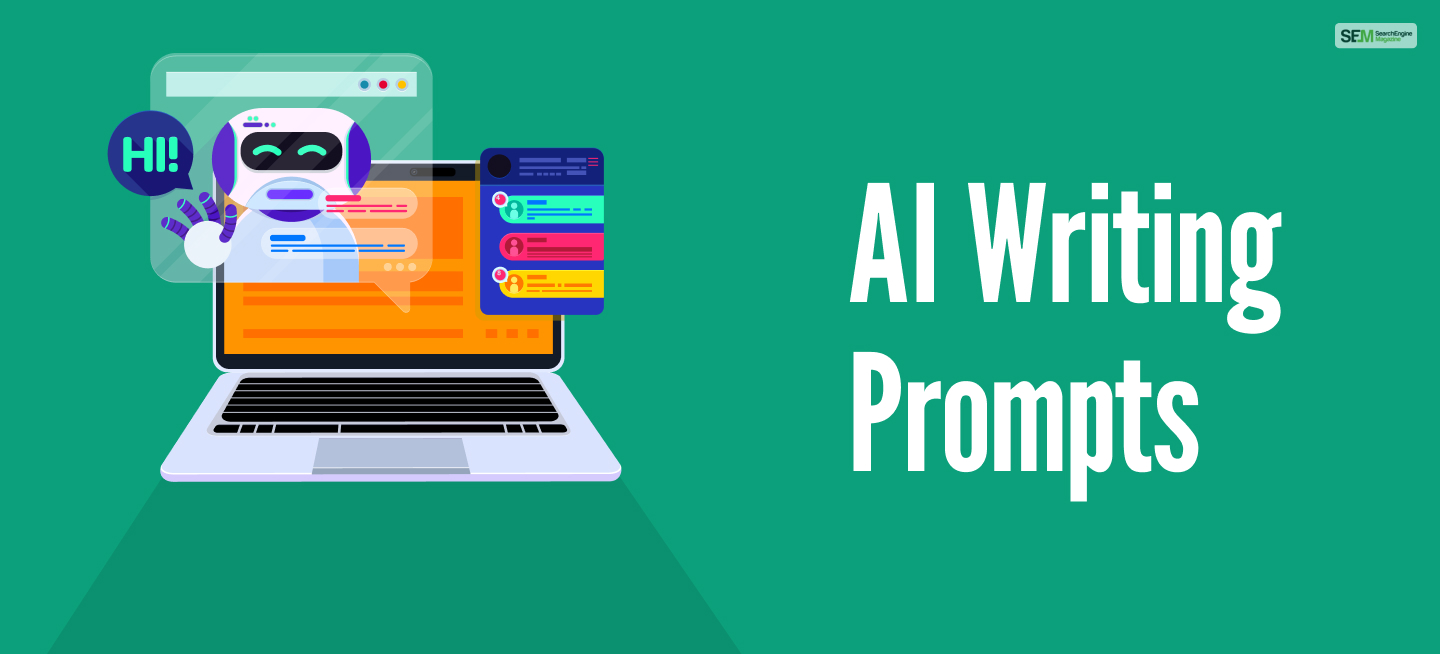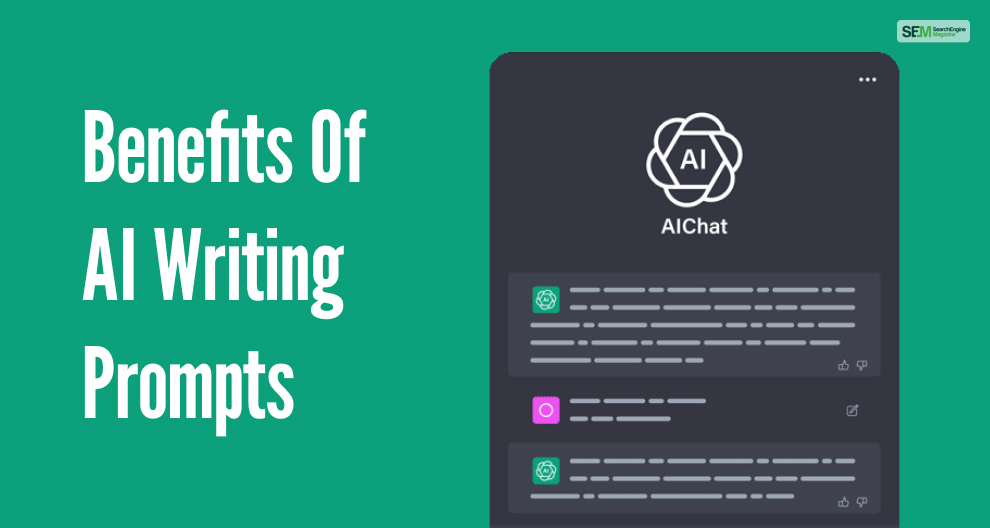How To Know If Someone Blocked You On iMessage? 5 Secret Hacks!
Apr 16, 2025

Apr 16, 2025

Apr 16, 2025

Apr 15, 2025

Apr 11, 2025

Apr 11, 2025

Apr 11, 2025

Apr 08, 2025

Mar 29, 2025
Sorry, but nothing matched your search "". Please try again with some different keywords.


AI writing prompts are cues or suggestions generated by artificial intelligence systems to inspire or guide the creative writing process.
People make these prompts to spark ideas, creativity, and storytelling by providing a starting point or direction for writers.
Therefore, read this post if you want to learn how AI writing prompts work and how to write them better.

As the name suggests, AI writing prompts have a simple task – generate answers to your queries.
However, when you input an AI writing prompt, the AI tool you use (like Jasper AI) goes through its internal process to generate answers based on your prompts.
Therefore, you can break down this inner process of AI-generated writing prompts into a few simple steps, which are
AI models analyze vast amounts of text, literature, articles, stories, and other written content. Therefore, this helps the AI (like chat GPT prompts) to understand language patterns, themes, and styles.
Using machine learning algorithms, AI identifies common themes, structures, and elements within text. Therefore, the AI recognizes phrases, settings, characters, emotions, and plot points frequently appearing in compelling narratives.
Based on learned patterns, AI generates writing prompts by suggesting scenarios, characters, settings, conflicts, or themes writers might like.

Did you know that AI writing prompts can be of various types? Therefore, if you wish to master the art of writing AI writing prompts for various ChatGPT-like tools, remember these types.
These prompts provide initial ideas or scenarios to begin a story. For example, “Write a story about a character who discovers a mysterious object in an old attic.”
Prompts that focus on creating and developing characters. For instance, “Describe the personality traits of a protagonist who has the ability to time travel.”
AI can suggest settings or environments as prompts, like “Describe a futuristic cityscape where humans coexist with robots.”
Prompts that introduce unexpected turns or conflicts in a narrative. For example, “Write a story where the main character’s best friend turns out to be their worst enemy.”
AI can generate prompts tailored to specific genres like fantasy, science fiction, romance, mystery, etc. Therefore, this is more suitable for AI image generators like Midjourney AI.

Learning how to write good AI writing prompts has various benefits, such as:
They catalyze creativity, especially when writers encounter writer’s block or need fresh ideas. This is why many writers use tools like Copy AI.
AI generates many prompts, introducing writers to concepts or themes they might not think on a normal day. However, anyone can detect them using an AI essay detector.
Writers can often specify preferences for prompts, such as genre, mood, or character type, to align with their interests. Moreover, you can look into an AI prompt generator tool to understand better the art of writing AI prompt.
You can use AI writing prompt for various forms of writing, including short stories, novels, poetry, and essays. In addition, you may use it for brainstorming sessions for content creation in marketing or other fields.
Improving at generating AI writing prompt involves a mix of understanding narrative elements, exploring diverse ideas, and using AI tools.
Therefore, here are some tips to enhance your skills in crafting effective writing prompts and make the best prompts for ChatGPT:
There are three things to remember here:
You must explore various genres, from fantasy and science fiction to romance and mystery. Therefore, try to understand the defining elements and tropes of each genre.
In addition, experiment with blending genres to create unique and unconventional story ideas.
Study existing AI writing prompt and examine how they introduce characters, conflicts, or settings.
Therefore, you must read various stories and narratives to understand how different elements contribute to engaging storytelling.
Practice generating prompts regularly. Henceforth, start with broad prompts and then focus on refining them to be more specific and engaging.
Once you generate a prompt, explore different variations and possibilities it can lead to, expanding the initial concept.
Try to get acquainted with AI writing tools and their features. Therefore, try to understand how to input parameters or preferences for generating prompts.
However, if you use AI for research-based prompts, refine your search queries to get specific and relevant suggestions.
You must introduce prompts that evoke emotions or explore the emotional journey of characters. Therefore, craft prompts that revolve around specific themes or convey underlying messages.
Share your prompts with peers or writing communities. In addition, gather feedback on the effectiveness and appeal of your prompts. Henceforth, continuously use this feedback to refine and improve your prompt generation skills.
Encourage creative thinking by exploring unusual scenarios, unconventional characters, or unexpected plot twists. Therefore, experiment with prompts that challenge standard narrative conventions or tropes.
AI writing prompts are a tool that complements a writer’s creativity. While they offer inspiration and guidance, the ultimate direction and development of a story or piece of writing depend on the writer’s imagination and storytelling skills.
By honing your understanding of storytelling elements, practicing regularly, exploring diverse genres, leveraging AI tools effectively, and incorporating feedback, you can improve your skills in crafting AI writing prompts that inspire engaging and imaginative stories.
However, if you have any questions about using AI writing prompt, comment below!
Also read
Mashum Mollah is the feature writer of SEM and an SEO Analyst at iDream Agency. Over the last 3 years, He has successfully developed and implemented online marketing, SEO, and conversion campaigns for 50+ businesses of all sizes. He is the co-founder of SMM.
View all Posts
How To Know If Someone Blocked You On iMessag...
Apr 16, 2025
7 Website Design Mistakes That Are Hurting Yo...
Apr 16, 2025
Programmable Dynamic SEO for Location-Based P...
Apr 15, 2025
Google Boba Game: How To Play This Fun Game B...
Apr 11, 2025
Which Is The Best Video Search Engine Of 2025...
Apr 11, 2025

